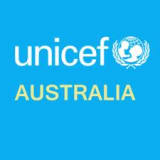
United Nations Children's Fund Australia (UNICEF Australia)
About
UNICEF works in over 190 countries to promote and protect the rights of children. The world’s largest provider of vaccines for developing countries, UNICEF supports child health and nutrition, clean water and sanitation, quality basic education for all boys and girls, and the protection of children from violence, exploitation, and HIV.
UNICEF Australia is a non-government organisation established more than 30 years ago. We are one of 36 National Committees around the world who play a vital role in generating fundraising revenue, public support and awareness for the organisation's work.
Serving as the public face and dedicated voice of UNICEF, the National Committees work tirelessly to raise funds from the private sector, promote children’s rights and secure worldwide visibility for children threatened by poverty, disasters, armed conflict, abuse and exploitation. UNICEF is funded exclusively by voluntary contributions, and the National Committees collectively raise around one-third of UNICEF's annual income. This comes through contributions from corporations, civil society organizations and more than 6 million individual donors worldwide.
They also rally many different partners – including the media, national and local government officials, NGOs, specialists such as doctors and lawyers, corporations, schools, young people and the general public – on issues related to children’s rights. UNICEF Australia is a company limited by guarantee.
What We Do
While Australia is a wonderful country for most of its children, disparity exists among some of our youngest and therefore most vulnerable populations. UNICEF research shows that 10.9 per cent of children in Australia live in relative poverty. The most at-risk groups are Aboriginal and Torres Strait Islander children, children in out-of-home care and children of asylum seekers.
Through the following initiatives, UNICEF Australia advocates on behalf of all children in Australia and works to ensure the government is held to account.
Child Rights Taskforce
UNICEF Australia co-convenes the Child Rights Taskforce, Australia’s peak child rights body made up of almost 100 organisations, advocating for the protection of child rights in Australia. Speaking with a united voice, it is our job to lead the sector-wide approach to the UN on how we think the Australian Government is faring in its commitment to children.
Listen to Children Report
The Listen to Children Report, compiled by the Child Rights Taskforce, was developed following consultations with over 750 children and young people and over 100 organisations and subject matters. It found that while Australia is a wonderful place for most of its children, certain children are disadvantaged by the failure of governments.
Australian Government Reports to the UN
On 4-5 June 2012, the Australian Government came before the UN Committee on the Rights of the Child to respond to questions on its commitment to improving the fundamental rights and welfare of its children.
Young Ambassadors
UNICEF Australia Young Ambassadors have an exciting and unique role as passionate youth campaigners, working alongside UNICEF Australia to represent the views and interests of Australia’s young people as youth spokespeople.
Baby Friendly Health Initiative
The Baby Friendly Health Initiative (BFHI) was developed jointly by the World Health Organisation and UNICEF in 1991. The initiative is a global effort for improving infant health by supporting mothers to breastfeed their babies.
Australian Parliamentary Association
The Australian Parliamentary Association for UNICEF was founded in 1987 and currently has over 60 members representing all political parties.
Child Friendly Cities
The Child Friendly Cities Initiative (CFCI) was launched in 1996 to make cities liveable places for all; in UNICEF terms, for "children first." A Child Friendly City is actively engaged in fulfilling the right of every young citizen to influence decisions about their city.
Focus Areas
- Education
- Child Survival and Development
- Child Protection
- HIV/AIDS
- Water and Sanitation (WASH)
- Emergency Response
- Sports for Development
- Governance and Policy



Experience
Company Offices
- Australia (headquarters)
- Sydney
- Level 4, 280 Pitt Street